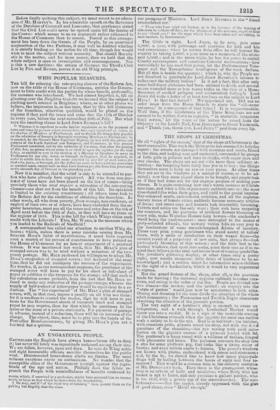WHIG POPULAR MEASURES.
THE bill for relaxing the rate-paying clauses of the Reform Act, now on the table of the House of Commons, entitles the Govern- ment to little credit with the parties for whose benefit, professedly, the measure was introduced. We had almost forgotten it. till on glancing over the Brighton Gazette we learned that the subject is exciting much interest in Brighton ; where, as in other places we believe, the impression is, or has been, that by this bill claimants of the franchise, otherwise qualified, would be placed on the register if they paid the taxes and rates due the 11th of October in every year, before the next succeeding 20th of July. But what says the enacting clause in Lord JOHN RUSSELL'S bill ?
" Whereas it is expedient to. make further regulation as to the payment of rates and taxes by persons whose names hare been once registered as voters in the election of Members of Parliament, and to abolish the stamp-duty payable on the admission of freemen in boroughs returning Members to Parliament; be it enacted, by the Queen's Most Excellent Majesty, by and with the advice and consent of the Lords Spiritual and Temporal, and Commons, in this present Parliament assembled, and by the authority of the same, that after the passing of this Act, no person whose name is or shall be upon the register for the time being, as entitled to vote in the election of a Member or Members to serve is Parliament for any city, town, or borough in England, shall be required, in order to entitle him to have his name inserted in any list of such voters for that city, town, or borough, for the .ti,llowing year, to have paid any poor-rates or assessed taxes, except such as shall have become payable from bins previously to the eleventh day of October in the preceding year."
Now it is manifest, that the relief is only to be extended to par- ties who have already been registered. All who from non-pay- meat of taxes have not been placed on the list of voters—being precisely those who most require a relaxation of the rate-paying clauses—are shut out from the benefit of this bill. Its operation is limited to the existing constituency ; all others must look to the Reform Act for the conditions of obtaining the franchise. In other words, all who from poverty, from nonage, non-residence, or neglect of their own or of others, have been excluded from the re- gister heretofore, must pay all the taxes and rates due on the Gth of April next before the 20th of July, or they will have no place on the register of 1838. This is the bill for which Whigs claim such credit with the Liberals ! This, Mr. WARD, is the measure which you lauded to the Radicals of Sheffield ! A correspondent has called our attention to another Whig de- lusion; which, unless there is some mistake arising from Mr. SPRING RICE'S habit of mystification, it must have required even a stretch of his powers of countenance to have palmed on the House of Commons for an honest experiment of a practical reform. It was mentioned last week, that Mr. HILL'S plan of stamped covers was to be tried without a reduction of the two- penny postage. Mr. RICE professed his willingness to adopt Mr. limes suggestion of stamped covers ; but declared at the same time, that he did not anticipate the success of the experiment. No wonder, if, as our correspondent supposes, the purchaser of the stamped cover will have to pay for his sheet or hale-sheet of paper in addition to the twopence for the stamp: and that such is the calculation seems probable, from the fact that Mr. RICE re- fused to make any reduction of the postage-charge, whereas the supply of half-a-sheet of letter-paper would be equivalent to a re- duction. The " fair experiment" of Mr. lItee's plan of stamped covers, will, in that case, impose a penalty on all who use them ; for it is needless to remind the reader, that he will have to pay more for the Government sheets of curiously lined and stamped paper he may require, than for that which he purchases by the quire or the ream at a private stationer's. For payment of postage in advance, instead of a reduction, there will be an increase of the charge. The object, then, must be to play into the hands of the P, est-office Bumbureaucracy, by giving Mr. Hue's plan not a fair trial but a quietus.


























 Previous page
Previous page